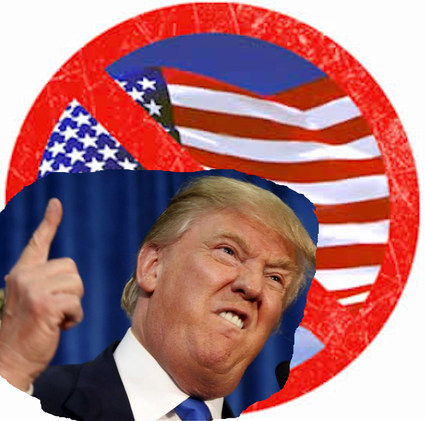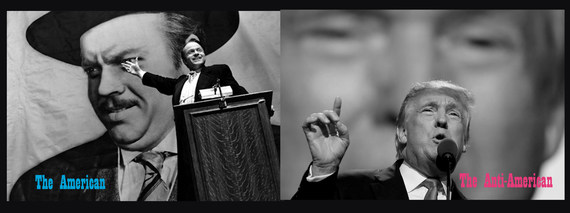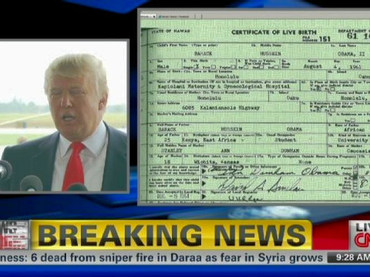"I am, have been, and will be only one thing--an American."
-- Charles Foster Kane
"WAKE UP AMERICA; WAKE UP!" Those words, spoken by John Lewis just before he ended his speech at the 1963 March on Washington, are as imperative today as they were 53 years ago.
During this Labor Day week, the traditional start date for fall presidential campaigns, the time is overdue for all Americans to wake up and fully recognize that this is no ordinary election, that one of the candidates represents an unprecedented threat to America, and just how extensive that threat is.
♦ ♦ ♦
The original title of Donald Trump's favorite movie, Orson Welles' Citizen Kane, was "The American." Trump has, with justification, been characterized by many terms--among them a bully, a narcissist, a pathological liar, a megalomaniac, a sociopath, a misogynist, and a xenophobe. It has, though, become apparent in recent weeks that the 2016 Republican nominee is, above all else, the opposite of what Welles saw Kane as. Trump is something never before seen as a major party presidential nominee: The Anti-American.
The giant leap taken by Trump and his associates since the party conventions is to aim their attack squarely at American democracy itself. More about that in a moment.
Welles plainly intended his protagonist to represent America. As many observers have pointed out, the similarities between the semi-fictional Charles Foster Kane and the semi-real Donald John Trump are unmistakable: the bombastic, bullying, privileged narcissist who inherited wealth, and falsely poses as the champion of the (white) working man. Consider how perfectly the following statements about Kane fit Trump: "But he never believed in anything except Charlie Kane. He never had a conviction except Charlie Kane in his life." "He had no use for anybody who disagreed with him on any point, no matter how small it was." When Kane's first wife warns him, "People will think ..." Kane responds loudly, "What I tell them to think!" Kane was, Welles said, "interested in imposing his will" on the nation as an act of self-aggrandizement.
Surely it seems, as Benjamin Hufbauer wrote recently in Politico, that "in playing out his narcissism on the national stage, Trump is making Citizen Kane, an old, black-and-white movie seen mainly by movie buffs, almost into a prophesy."
Yet focusing on all the parallels--indeed, virtual identities--between Kane and Trump hides the key point that when it comes to representing America they are diametric opposites. The portrait of "The American" that Citizen Kane presented was anything but a complimentary one, but it was of an American. The portrait that The Trump Campaign presents is of an Anti-American.
♦ ♦ ♦
Throughout the nation's history, as historian Richard Hofstadter pointed out a half century ago at the time of the Barry Goldwater candidacy, there has been a "Paranoid Style in American Politics"--a "recurrent phenomenon in our public life which has been frequently linked with movements of suspicious discontent." There was, Hofstadter contended, an important difference between earlier incarnations of this phenomenon and the form it had taken since World War II. The earlier movements had perceived a need to fend "off threats to a still established way of life." The conspiratorial menace they perceived came from outside the main institutions of America. In contrast, since the late 1940s, the angry Americans had come to believe that the nation had "been largely taken away from them and their kind." Their mission now was to repossess America "and to prevent the final destructive act of subversion."--to "Take America Back," as the Trump supporters say.
The clearest early example of this new form of paranoia that was offensive rather than defensive is what came to be known as McCarthyism, though other such other politicians as Richard Nixon had been pushing similar arguments before Sen. Joseph McCarthy joined them. Sounding almost exactly like Donald Trump in 2016, McCarthy proclaimed in 1951: "How can we account for our present situation unless we believe that men high in this government are concerting to deliver us to disaster? This must be the product of a great conspiracy on a scale so immense as to dwarf any previous such venture in the history of man."
Once the imagined conspirators had been classified as already on the inside, the nature of the fight changed. The mortal threat was now seen as coming from "major statesmen who are at the very centers of American power."
The Trump candidacy is the culmination of the long campaign begun by McCarthyism and the John Birch Society in the 1950s and aimed at discrediting virtually every institution in the United States. By the early 1960s, the epicenter of the extremist movement was Dallas. During the 1960 campaign, a "mink coat mob" of right-wing high-society Dallas women accosted native Texan Lady Bird Johnson. 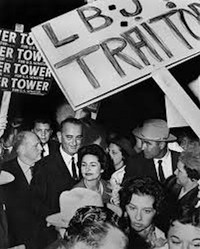 The high-heeled thugs encircled the wife of Democratic vice-presidential nominee, jeering and cursing. One of these ladies of the right pulled Mrs. Johnson's white gloves out of her hands and threw them into a gutter. Another hit Mrs. Johnson over the head with a sign reading, "LET'S GROUND LADY BIRD," and then spit toward her face. Primal rage was unmistakable on the faces of these Dallas matrons. It should be noted that this first violent, hate-filled political mob of the calendar 1960s was not composed of scruffy young left-wing anti-Establishment "reds"; it was made up of "mature," neatly dressed "conservative" women of Texas.
The high-heeled thugs encircled the wife of Democratic vice-presidential nominee, jeering and cursing. One of these ladies of the right pulled Mrs. Johnson's white gloves out of her hands and threw them into a gutter. Another hit Mrs. Johnson over the head with a sign reading, "LET'S GROUND LADY BIRD," and then spit toward her face. Primal rage was unmistakable on the faces of these Dallas matrons. It should be noted that this first violent, hate-filled political mob of the calendar 1960s was not composed of scruffy young left-wing anti-Establishment "reds"; it was made up of "mature," neatly dressed "conservative" women of Texas.
In October 1963, United States ambassador to the U.N. Adlai Stevenson was loudly jeered and threatened physically by people associated with ultra-right wing groups during a visit to Dallas.
It was, then, with good reason that President John F. Kennedy said to his wife on the morning of November 22, 1963, "We're heading into nut country today." He showed her an ad, bordered in the black of a funeral announcement, placed by the Birch Society in the Dallas Morning News, saying that the Kennedys were pro-communist.
The hatred brewing in Texas in the years leading up to that fateful day in Dallas was similar to the right-wing witches' caldron being stirred to a bubbling boil by talk radio, Fox News, and the Tea Party that has finally boiled over with the Trump campaign.
A presidential assassination less than a year before the next election gave extremism a bad name and assured that 1964 Republican nominee Barry M. Goldwater's seeming embrace of such extremist organizations as the Birch Society and the Ku Klux Klan would doom him to disastrous defeat. Yet Goldwater wasn't nearly as extreme as Trump is.
By the late 1960s, the bitter anger against a government perceived as oppressive was again growing, as evidenced in George C. Wallace gaining 13.5 percent of the votes for president in 1968. Following that election, President Richard M. Nixon made the fateful decision to try to add the Wallace voters to those who had cast their ballots for him by pursing a "Southern Strategy." Nixon's young advisor Patrick J. Buchanan urged the President to split the country apart in a way that he could pick up "far the larger half."
Vietnam and Watergate, combined with the innumerable lies told by Presidents Johnson and Nixon, further undermined the reputation of the government in the minds of many Americans. "For some citizens, the Government has almost become like a foreign country," President Jimmy Carter noted in his 1978 State of the Union Address. Two and a half years later, Carter addressed the nation about what he termed a "crisis in confidence." He warned of "a fundamental threat to American democracy," a major component of which was "a growing disrespect for government and for churches and for schools, the news media, and other institutions."
After defeating Carter, Ronald Reagan proclaimed in his first Inaugural Address, "government is not the solution to our problem; government is the problem." Reagan continued to denounce and run against what he disdainfully pronounced as the "gub-mint" even after he had been its head for years.
The constant drumbeat from such right-wing talk radio hosts as Rush Limbaugh and G. Gordon Liddy on how the government was the enemy of the American people grew as the 1980s gave way to the 90s, particularly after Bill Clinton became president in 1993. In 1996, Fox News added visuals to the fear-mongering sounds coming from radios.
When domestic terrorists blew up the federal building in Oklahoma City in 1995, it was clear that they had been influenced by hate speech to see the United States government as a foreign country--an enemy against which the American people should make war.
In 1994, Sen. Jesse Helms (R, NC) said President Bill Clinton "better have a bodyguard" if he came to North Carolina. 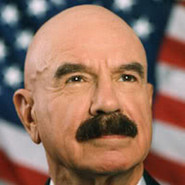 The following year, Liddy told his listeners that he used drawings of Bill and Hillary Clinton for target practice. "I thought it might improve my aim," he said. "It didn't. . . . Having said that, I accept no responsibility for somebody shooting up the White House."
The following year, Liddy told his listeners that he used drawings of Bill and Hillary Clinton for target practice. "I thought it might improve my aim," he said. "It didn't. . . . Having said that, I accept no responsibility for somebody shooting up the White House."
Although the horror of the Oklahoma City carnage caused some lessening in the decibel level of right-wing hate speech for a time, conspiracy stories about the Clintons continued to be repeated and consolidated into books. One of the favorites was that the Clintons had murdered Deputy White House Counsel Vince Foster, who committed suicide in 1993. As he has with just about every other long-disproven charge against the Clintons, Donald Trump latched onto this one, stating in May, "I don't know enough to really discuss it, but I will say there are people who continue to bring it up because they think it was absolutely a murder." The circumstances of Foster's death were, the Republican candidate said, "very fishy."
The level of right-wing paranoia declined a bit during the presidency of George W. Bush, particularly after the attacks of September 11, 2001 produced a temporary national unity, but the frenzy reached new heights--or, more accurately, depths--with the election of Barack Obama in 2008. Obama is the sum of all the fears of the people who have been the core of the "movements of suspicious discontent." It is bad enough--absolutely horrible in their minds--that Obama is black and has an international background. But it is far worse even than that. While racist white men hated black people, their greatest horror was what they called "miscegenation" and "mongrelization." Those terms had never referred to white men having sex and producing offspring with black women, which occurred routinely under slavery. The "pervading dread" of the white man, as Malcolm X said in 1964, "was his image of the black man entering the body of the white woman."
Lynching and segregation were about "protecting" those whom white men classified as "our women." Prior to the 1954 Brown decision, for example, President Dwight D. Eisenhower tried to influence new Chief Justice Earl Warren to allow segregation by telling him that southern whites were not bad people: "All they are concerned about is that their sweet little girls are not required to sit in schools alongside some big black bucks." But on January 20, 2009, the product of a black man and a white woman become president of the United States! It was enough to drive a certain sort of person in insane--and it did. 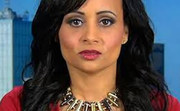 After Obama's inauguration, the "Tea Party" was formed to consolidate opposition to him. "This corrupt country has a head Negro in charge," Tea Party activist and later Trump campaign spokeswoman Katrina Pierson said in 2013, after having tweeted in 2012 that Obama was not a "pure breed." (Ms. Pierson also likes to wear a necklace of bullets and thinks the United States did not go into Afghanistan until Barack Obama was president.)
After Obama's inauguration, the "Tea Party" was formed to consolidate opposition to him. "This corrupt country has a head Negro in charge," Tea Party activist and later Trump campaign spokeswoman Katrina Pierson said in 2013, after having tweeted in 2012 that Obama was not a "pure breed." (Ms. Pierson also likes to wear a necklace of bullets and thinks the United States did not go into Afghanistan until Barack Obama was president.)
In 2011, Trump himself became the most prominent figure in one of the wilder conspiracy theories of the Obama haters, the claim that the President had not been born in the United States and so was ineligible for the presidency. When Trump took up the cause, it had already been repeatedly debunked, but continued to be believed by many people who were angered by the election of a black president. For six weeks in 2011, Trump pressed the "issue" almost nonstop and by so doing he thrust himself into prominence in the constellation of angry right-wing extremists.
♦ ♦ ♦
After more than a half century of angry, fearful right-wingers fouling the well from which all Americans drink, it may have seemed that it could not get worse. Yet it has. Donald Trump has now completed the poisoning of the common water that sustains our nation by not only turning against almost every American institution and value, but by attacking our very political system.
All the worst in the alternate reality world of suspicious discontent is brought together in Trump. He has attacked the media, the military, minorities, women, immigrants, the judiciary, science, free speech, the FBI, the CIA and American Intelligence services, NATO, religious freedom, people with disabilities, the Geneva Convention, common decency, veterans, war heroes, fire marshals, major league baseball . . . the list goes on and includes just about every revered institution in America apart from motherhood--no, wait, he has attacked mothers, as well: Gold Star Mother Ghazala Khan. Someone should ask him for his views on apple pie.
Though it seems that he never heard of a foreign dictator he didn't like, Donald Trump has never met an American value or institution that he does like.
Outrageous as all of that is, the Republican nominee has taken the danger he represents to America up at least one quantum in recent weeks.
It has long been clear that a victory in November by Trump could be catastrophic for the United States. Now, though, the Republican nominee and his backers have become so extreme in their pronouncements that a Trump defeat also poses a serious threat to American democracy.
During his campaign for the Republican nomination, Trump repeatedly encouraged his supporters to use violence against those who oppose him: "I'd like to punch him in the face," "I love the old days . . . they'd be carried out on a stretcher, folks," "knock the crap out of him," and so on.
Building on his lies about Barack Obama not being an American, Trump has indicated that the President may be in league with foreign terrorists. In June, after the terrorist attack in Orlando, Trump suggested that Obama either "doesn't get it or he gets it better than anybody understands. . . . There's something going on." Perhaps concerned that his followers might not get a veiled accusation that the President of the United States is in cahoots with Islamic terrorists, Trump removed all subtlety in August when he repeatedly and forcefully stated that Obama "is the founder of ISIS." He added that Hillary Clinton is the co-founder of the terrorist organization.
What is a patriotic American to do if he is persuaded that the President and a presidential candidate are traitors? In case such a person wasn't sure, Trump told a rally in North Carolina on August 9 that "Second Amendment people" could do something about a President Hillary Clinton. Though Trump and his campaign claimed that he wasn't suggesting assassination, it is difficult to hear or read his statement any other way--surely some of his lunatic fringe followers took it that way. 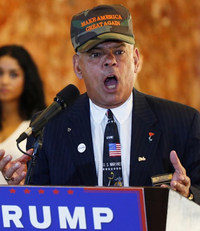 And one of Trump's advisers, Al Baldasaro, had already said repeatedly that "Hillary Clinton should be put in the firing line and shot for treason"--a position that did not cause Trump to disassociate himself from Baldasaro.
And one of Trump's advisers, Al Baldasaro, had already said repeatedly that "Hillary Clinton should be put in the firing line and shot for treason"--a position that did not cause Trump to disassociate himself from Baldasaro.
By the time he suggested that "Second Amendment people" could do something about Mrs. Clinton, Trump was trailing her badly in the polls. He classifies himself as a "winner" and says "I don't like losers." In his mind, that means that he cannot lose. It follows from that axiomatic belief that if he loses it must be because the election was "rigged." "I'm afraid the election's gonna be rigged, I have to be honest," Trump told a crowd in Columbus, Ohio, at the beginning of August. He said that he was hearing "more and more" that the election would be rigged. Where he was "hearing" this rubbish was principally from Roger J. Stone Jr., a "political operative known for mischief and mayhem" who has been a key adviser to Trump dating back to the 2011 Birtherism campaign, and the alternate reality rightwing website, Breitbart.com.
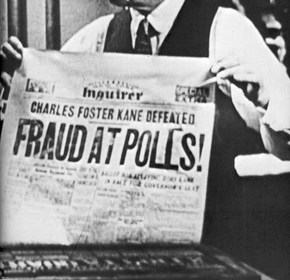 Donald Trump has continued to talk about a "rigged election." In a speech in Altoona on August 12, he proclaimed: "The only way we can lose, in my opinion--I really mean this, Pennsylvania--is if cheating goes on." He said this of a state that has gone Democratic in each of the last six presidential elections and at a time when the four most recent polls all showed him to be trailing in the state by 10 or 11 points. Unsurprisingly, when Donald Trump loses he acts like a child who loses at a game and yells that the other kid cheated. Here again, he is channeling Charles Foster Kane. When Kane was soundly defeated in his race for governor, rather than admit that he had lost, he ordered that his newspaper run the headline: "FRAUD AT POLLS!"
Donald Trump has continued to talk about a "rigged election." In a speech in Altoona on August 12, he proclaimed: "The only way we can lose, in my opinion--I really mean this, Pennsylvania--is if cheating goes on." He said this of a state that has gone Democratic in each of the last six presidential elections and at a time when the four most recent polls all showed him to be trailing in the state by 10 or 11 points. Unsurprisingly, when Donald Trump loses he acts like a child who loses at a game and yells that the other kid cheated. Here again, he is channeling Charles Foster Kane. When Kane was soundly defeated in his race for governor, rather than admit that he had lost, he ordered that his newspaper run the headline: "FRAUD AT POLLS!"
In warning that the election would be stolen from him, Trump added that his campaign would send people "down to certain areas and watch and study and make sure other people don't come in and vote five times." Plainly, saying "certain areas" was giving a wink to his followers that the cheating would be done by African Americans and urging his backers to go to polling places and intimidate minority voters.
Every indication is that Trump will lose Pennsylvania fair and square, but his followers are being primed to see it as their Leader being cheated and so to react with anger and perhaps violence.
Trump's hiring of arch-right zealot and conspiracy theorist Stephen Bannon, the head of Breitbart, to run his campaign was, as William Kristol, the conservative editor of the Weekly Standard said, 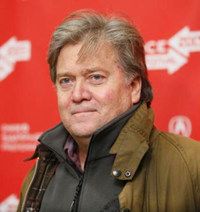 "the merger of the Trump campaign with the kooky right," and indicated, as the title of an article in that publication put it, that "Trump Has Decided to Live in Breitbart's Alternative Reality." A major part of that alternative reality is the campaign's continued pushing of the baseless and extremely dangerous assertion that the election will be rigged.
"the merger of the Trump campaign with the kooky right," and indicated, as the title of an article in that publication put it, that "Trump Has Decided to Live in Breitbart's Alternative Reality." A major part of that alternative reality is the campaign's continued pushing of the baseless and extremely dangerous assertion that the election will be rigged.
The effect that the Trump campaign is having on a significant number of Americans can be seen in the happenings among the Trump faithful observed by an incognito reporter during the candidate's first rally under the new management of Stephen Bannon, in Charlotte on August 19. Among them were: someone yelling, "Obama's a goddamn Muslim terrorist," two males "talking about beating the [crap] out of reporters," a guy saying that if Trump doesn't win "we'll either have a civil war or the country will die," people rolling their eyes about a disabled woman, with one of them saying, "I wish she'd leave," and many people saying that Trump will lose in November "because media has rigged the election."
Trump's first major television ad, which followed the Bannon campaign reboot and debuted on August 19, begins with an image of Hillary Clinton, which quickly cuts to a polling place and a sign "Vote Here" as a voiceover says, "In Hillary Clinton's America, the system stayed rigged against Americans." The ad then goes on to a variety of lies about immigrants and Mrs. Clinton's positions on them, but the opening is clearly a message intended to reinforce what Trump has been saying about the American political system being rigged.
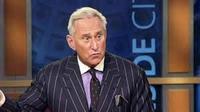 Just how dangerous this assault on the American democratic system itself is unmistakable in the comments Roger Stone made a few days before Donald Trump began his charges that the election would be rigged.
Just how dangerous this assault on the American democratic system itself is unmistakable in the comments Roger Stone made a few days before Donald Trump began his charges that the election would be rigged.
"If there's voter fraud, this election will be illegitimate," Stone proclaimed. "We will have a constitutional crisis, widespread civil disobedience, and the government will no longer be the government." "It will be a bloodbath," Stone continued. "The government will be shut down if they attempt to steal this and swear Hillary in. No, we will not stand for it."
Combined with Trump's oft-expressed admiration for such "strong man" leaders as Vladimir Putin, Saddam Hussein, Muammar Gaddafi, and Kim Jung Un, his declaration in his Republican Convention speech "Only I can fix it," his classifications of President Obama and Hillary Clinton as traitors, the hint from the candidate and the outright statement by his adviser that Mrs. Clinton should be shot, and his repeated assertions that the American presidential election will be "rigged," the suggestion that there will be a "bloodbath" to prevent the swearing in of Hillary Clinton as president amounts to a complete repudiation of the American democratic system and a call for the violent overthrow of the election results.
We have never before seen a major party presidential candidate remotely as antithetical to American values, American institutions, and American democracy itself as Trump is. While he talks of "making America great again," he trashes everything about America. What he seeks is to make Donald J. Trump great again, and he is completely willing to destroy America in the process.
Beyond all the other outrages by Trump, the attack on American democracy itself and the encouragement of violence if he loses is the final, ultimate anti-American act.
What Trump and his advisers are currently doing is far more "a fundamental threat to American democracy" than the "crisis in confidence" that Jimmy Carter identified as such a threat in 1979. The Trump campaign is a clear and present danger to our nation, its values, and its system of government based on accepting the results of elections and the peaceful transfer of power.
There can be only one accurate title for the horror film, now appearing on screens across the country, starring Donald Trump as a candidate for the presidency of the United States: The Anti-American.
{Robert S. McElvaine, the Elizabeth Chisholm Professor of Arts & Letters and Professor of History at Millsaps College, is the author of ten books. He is currently completing a book manuscript, "The Times They Were a-Changin': 1964--The Year 'The Sixties' Began."}

